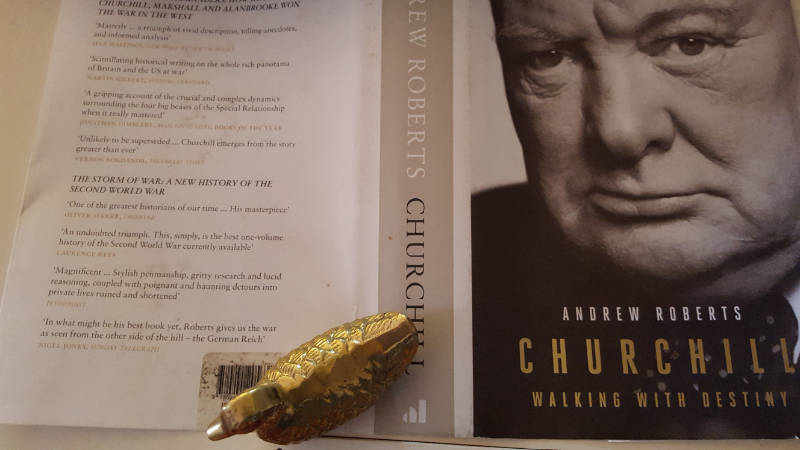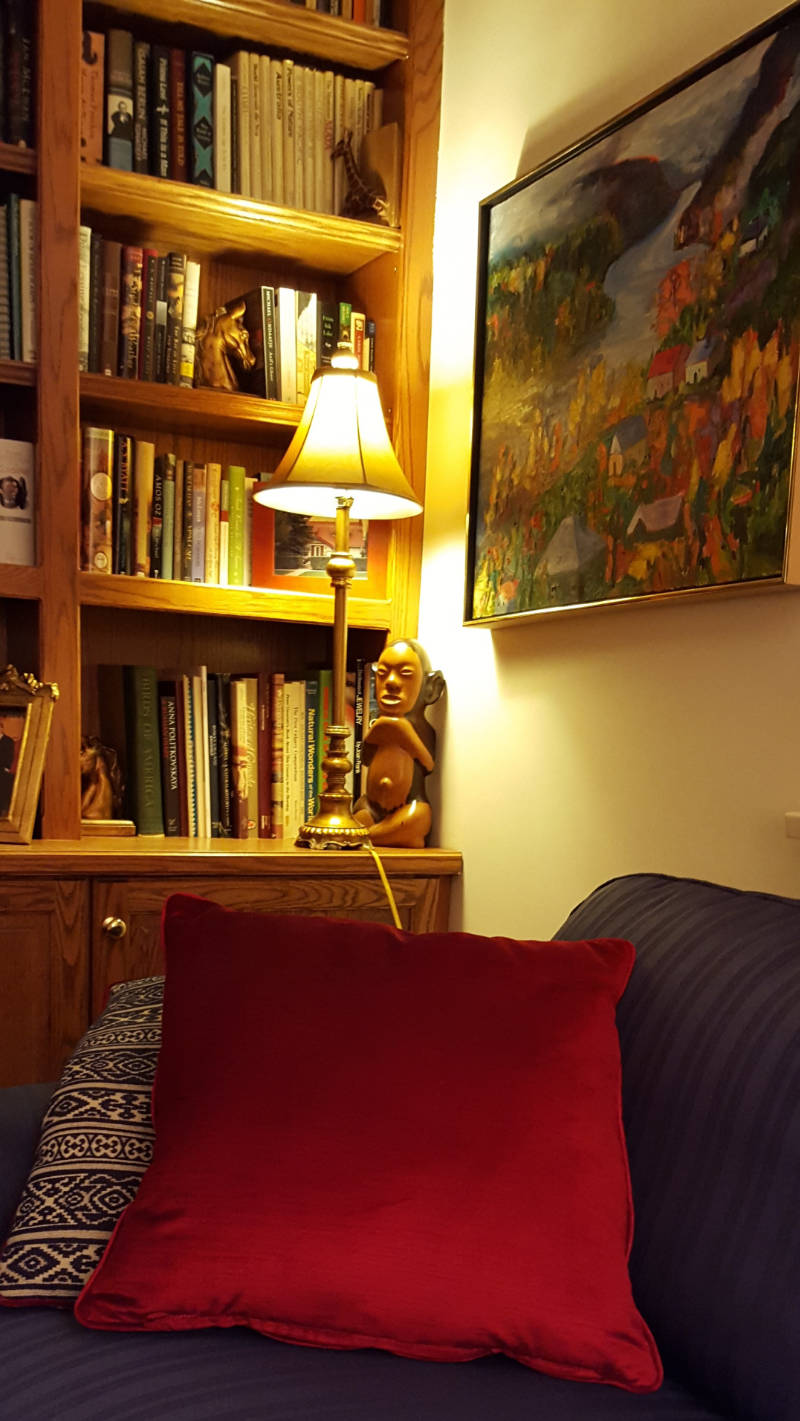
Churchill’s oratory
Mastering the language. Because he believed oratory was essential for a politician, Churchill set out to master public speaking in spite of a slight speech impediment. He believed there were five elements to great oratory: 1) “exact appreciation of words”; 2) the sound of the words; 3) “the steady accumulation of argument”; 4) “the use of analogy”; and 5) extravagant language. The last fit well with his love of ‘deliberately old-fashioned words’. And he used these five elements to become the greatest orator of his age. In contrast to so many today, who use pedestrian language and lace it with profanity when they want to give it vigour, it is still a joy to read—or even better, listen to—Churchill.
Mutual admiration for the language. As a writer & editor & teacher of the English language, I share “his admiration for the power and expressive range of the English language”. And I’ve repeated ad nauseam, especially to company executives and government bureaucrats, “If an English writer cannot say what he has to say in English, and in simple English, depend upon it, it is probably not worth saying,” Churchill said in a speech. But, sadly, they eschew simple words and the active voice because they think it diminishes their importance. After all, children use simple words, and executives and bureaucrats are far more important than children!

Next time, I’ll use Churchill’s words about one of his critics, “I am not one of those who take the Noble Lord too seriously. He is one of those orators of whom it was well said, ‘Before they get up, they do not know what they are going to say; when they are speaking, they do not know what they are saying; and when they have sat down, they do not know what they have said.’ ” The perfect description of much that is said in the House of Commons!
Churchill’s enduring wisdom
Quotes. Churchill has said so much, written so much and been written about so much that his golden nuggets are embedded in the culture of the Anglo-American world. And so many are as apt today as they were in his time of the first half of the 20th century. Among them:
• “Islam increases, instead of lessening, the fury of intolerance.” – Evidence abounds in the Middle East, and is seeping into Western world as our Muslim population grows.
• Horace’s “Dulce et decorum est pro patria mori” –“It is sweet and noble to die for one’s country” was part of his credo. – Sadly diminished in the social-justice warrior world, ‘warriors’ who appropriate the word but lack all of its characteristics.
• “You may, by the arbitrary and sterile act of Government, for, remember Governments create nothing and have nothing to give but what they have taken away—you may put money in the pocket of one set of Englishmen, but it will be money taken from the pockets of another set of Englishmen, and the greater part will be spilled on the way.”- Trudeau and Notley in action, eh?

British Empire. He believed that the British Empire directly succeeded to the great civilizations of Greece, Rome and Christendom, and felt it his duty to uphold the civility of that great inheritance. For instance, he was magnanimous in victory, an enlightened stance in a revenge-filled world. For instance, he kept separate the political and the personal, staying friendly and enjoying another’s company in private even after he or they had denounced the other in the public forum. And his philosemitism is truly admirable in a time when many of his fellow aristocrats were anti-Semitic, often virulently so—for instance, the Duke of Windsor’s disgraceful support of Hitler, which turned the trauma of his abdication into a huge blessing for England.
The Jews. Churchill wrote in the Illustrated Sunday Herald, February 8, 1920, “…but no thoughtful man can doubt the fact that they (the Jews) are beyond all question the most formidable and the most remarkable race which has ever appeared in the world…We owe to the Jews a system of ethics which, even if it were entirely separated from the supernatural, would be incomparably the most precious possession of mankind, worth in fact the fruits of all wisdom and learning put together. On that system and by that faith there has been built out of the wreck of the Roman Empire the whole of our existing civilization.” Amen to that!
Churchill’s political philosophy
Tory Democrat. He was a Tory Democrat with Edmund Burke as a major influence on his philosophical development. For example, Burke on democratic governance: “All Government – indeed every human benefit and enjoyment, every virtue and every prudent act is founded on compromise and barter”; for example, Burke on the value of history: “People will not look forward to posterity who never look backward to their ancestors.” And free enterprise was a central tenet in his idea of good government. As Churchill astutely observed of a member of the Independent Labour Party (precursor to UK’s Labour Party), “The Socialism of the Christian era was based on the idea that, ‘All mine is yours,’ but the Socialism of (your) Party is based on the idea the ‘All yours is mine.’ ”
Jeremy Corbyn, Labour Party’s current leader, embodies this idea more fully than any of his predecessors, and is supported by millions of historically ignorant youth. To feed their greed—not compassion, not sharing, just greed for power is their principal trait—lefties protest and leave garbage-strewn streets in their wake. Churchill cautioned against this lawless protesting: “The trampling down of law and order which, under the conditions of a civilized state, assure, life, liberty, and the pursuit of happiness, all this would be worse than bloodshed.” As night follows day, enough of this trampling and bloodshed becomes inevitable.
Bolshevik tyranny. “Of all the tyrannies in history, the Bolshevik tyranny is the worst, the most destructive, the most degrading…far worse than German militarism,” Churchill said shortly after World War I, describing the Russian Revolution as “a tide of ruin in which perhaps a score of millions of human beings have been engulfed. The consequences of these events will darken the world of our children’s children.” As Andrew Roberts writes, “This was both prophetic and numerically precise—at least twenty million people died under Soviet tyranny.”
Useful idiots. But there were the useful idiots such as Lloyd George—just as we have now littering the political landscape—accusing Churchill of class prejudice being at the root of his anticommunism. In July 1920, Churchill said, “My hatred of Bolshevism and Bolsheviks is not founded on their silly system of economics, or their absurd doctrine of impossible equality. It arises from the bloody and devastating terrorism which they practise in every land into which they have broken, and by which alone their criminal regime can be maintained.” Perfect case in the present tense: Venezuela!

Political cost. Although it cost him politically, Churchill never wavered from his condemnation of communism and its bloody means for tyrannical ends. And this was before Mao went on his killing spree, whose body count was even higher than Stalin’s. Now, we have our children’s children’s children rushing headlong into the communist abyss, led by the ‘intelligentsia’ that has been totally wrong on this file since Marx aired his grievances. And then progressives wonder why we common folk reject the ‘expert’ advice of this same ‘intelligentsia’?
Communism’s sister, Nazism. Churchill’s astute analysis of communism prepared him well to fight “Bolshevism’s sister-creed, Nazism”. It is deeply ironic that the left’s yelling, “Nazi!” at every conservative on the horizon betrays their abject ignorance of Nazism’s socialist principles. And just as Hitler narrowly defined his constituency, so, too, do today’s progressives, excluding anyone who so much as breathes a word of dissent about their ruling orthodoxies.

Churchill’s values
Black-dog days. Churchill was a workaholic long before the term was coined. His literary output was prodigious, and done amidst the often heavy workload of government duties as an MP and then as prime minister. Churchill’s bouts of depression—his black-dog days—are well known. What should also be well known—as a counter to our modern obsession with days off for every known and unknown ailment to man—is that “Churchill never missed a single day off work” because of it. Two activities he used to cope with his black-dog days were painting and bricklaying, both of which gave him pleasure and produced results that were admirable.
Colonialism’s benefits. Another sacred cow of our progressive modern world is that colonialism has done nothing but harm. Churchill was of a mind that the British Empire had been a force for good in the world, with the inevitable shortcomings that all human endeavours have. Support for that position came from Katherine Mayo, an American sociologist; in her book Mother India (1927), she “depicted a subcontinent in the grip of forced marriage before puberty, indigenous medicine, gang-robbery, primitive gynaecology and backward agriculture.”
The British were battling all of these problems in the face of great resistance from the natives benefitting from this societal organization. Mayo’s reams of evidence revealed “that far from Britain being an economic drain on India, trade has been mutually beneficial,” with almost all the richest people in India being Indian merchants or princes, not Britons. And it was Hindu religious leaders who threw everything they could in the way of the British attempts to educate the untouchables, prevent cruelty to animals and improve medicine. With power in the hands of the few, as so many native cultures are characterized by, why would these few welcome a diminishment of their power? There is a direct parallel with our indigenous people in Canada, and it’s disingenuous in the extreme to pretend all was sweetness and light before the Europeans came.

Brahmins’ tyranny. In his usual witty style, backed up by facts, Churchill argued for continued British rule in India. “To abandon India to the rule of the Brahmins would be an act of cruel and wicked negligence. It would shame forever those who bore its guilt. These Brahmins who mouth and patter the principles of Western Liberalism, and pose as philosophic and democratic politicians, are the same Brahmins who deny the primary rights of existence to nearly sixty million of their own fellow countrymen whom they call ‘Untouchable’, and whom they have by thousands of years of oppression actually taught to accept this sad position…And then in a moment they turn around and begin chopping logic with John Stuart Mill, or pleading the rights of man with Jean Jacques Rousseau.”
The Left’s truth. Truth—not my truth or your truth as social-justice warriors try to characterize it—is so refreshing and is needed more than ever in our politically correct nest of half-truths and outright lies. But home rule won the day, championed by the usual leftwing zealots, and rivers of blood followed. A gradual road to independence, similar to the road taken by Canada and Australia, may have led to less bloodshed and an increasingly educated citizenry, a vital ingredient for a successful liberal democracy.
Churchill’s war leadership
Defeating the Nazis. Churchill’s crowning achievement was his inspiring, unflagging leadership against the Nazis in World War II. And before that “…he was the first, most eloquent, best-informed and for a very long time the only senior British politician to warn of the threat that Hitler was increasingly posing to peace, civilization and the British Empire,” writes Andrew Roberts. Western civilization is forever in his debt. His warnings were met with disbelief and often outright derision. But knowing history as he did, Churchill wasn’t cowed, just realistic. About Britain’s failure to rearm, Churchill said, “There is nothing new in the story. It is as old as the Sibylline Books. It falls into that long, dismal catalogue of the fruitlessness of experience and the confirmed unteachability of Mankind. Want of foresight, unwillingness to act when action would be simple and effective, lack of clear thinking, confusion of counsel until the emergency comes, until self-preservation strikes its jarring gong—these are the features which constitute the endless repetition of history.”
His finest hour. And then he rose to his finest hour, elevating all citizens of the British Commonwealth of Nations with him. “War is horrible, but slavery is worse, and you may be sure that the British people would rather go down fighting than live in servitude.” And he dismissed a specious notion often pompously declared by lefties: “A lot of people talked a lot of nonsense when they said wars never settled anything; nothing in history was ever settled except by wars.”
The darkest hour. At the darkest hour in 1941 for the Allies, Churchill said, “I have nothing to offer but blood, toil, tears and sweat.” But he said, “This is the lesson: never give in. Never give in. Never, never, never, never—in nothing, great or small, large or petty. Never give in except to convictions of honour and good sense. Never yield to force; never yield to the apparently overwhelming might of the enemy.” He didn’t. The British people didn’t. The British Commonwealth peoples didn’t. And then the Americans didn’t. May we all fight to preserve this legacy—Western civilization and its hallmarks of individual freedom and equality of opportunity—that Churchill’s walk with destiny bequeathed us.

Churchill’s lesson for conservatives
All great people embody lessons for future generations. Churchill’s lesson in our progressively left-leaning world gives heart to us conservatives: “We conservatives shall go to the end. We shall fight in the ballot box. We shall fight in the legislatures and the House of Commons. We shall fight with growing confidence and growing strength in the courts. We shall defend our families, whatever the cost may be. We shall never surrender.”
And this determination in the face of Remainer resistance has given British conservatives—and their cousins in the Commonwealth and across the globe—reason to celebrate: They finally have a prime minister, Boris Johnson, who will accomplish what the majority of Britons voted for and take Britain out of the European Union. They will be sovereign in their own country. Hip, hip, hurrah!
